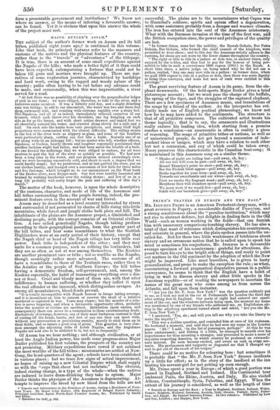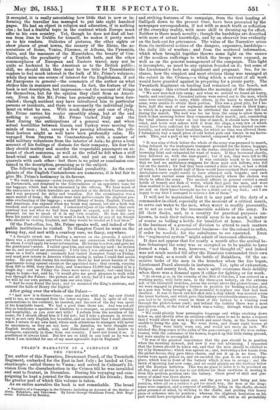PRIME'S TRAVELS IN EUROPE AND THE EAST. * MR. IRENJEUS PRIME
is an American Protestant clergyman, with a great aversion to Popery, a considerable dislike of Puseyism, and a strong sensitiveness about the " peculiar institution," which may not rise to abstract defence, but delights in finding facts in the Old World—such as women working in the fields—that can furnish him with unsavoury comparisons touching slavery. He has also a taint of that want of reticence which distinguishes his countrymen, and colonists in general, where the plain-spoken passes into the un- called-for. But for these two little weaknesses of tetchiness about slavery and an erroneous notion that he is called upon to speak his mind or sometimes his conjectures, Mr. Irenteus is a favourable average specimen of his countrymen : grateful for attentions, dis- posed to turn his eye to the bright side of things, and ready to point out matters in the Old continent by the adoption of which the New might be improved. Like most travellers, he is given to hasty generalization, and prone to make the exception the rule ; as when, encountering a forward pragmatical disputative person in a public conveyance, he seems to think that the English have a habit of lying in wait to discuss slavery and other little specks in the American republic—or of reading the newspapers to ascertain the names of the great men who come among us from across the
Atlantic, and fall upon them instanter.
" Are you the Mr. P. from New York ?' was the question suddenly put to me, as I took my seat in the car at Portsmouth for London the third day after setting foot in England. Our party of eight had entered one apart- ment of the car, and the windows between being open, the moment my name was mentioned by one of my friends who addressed me, an Englishman sit- ting in the adjoining apartment turned about and asked, Are you the Mr. P. from New York ? ' " I answered, 'Yes, sir ; and will you tell me why you take the liberty to make the inquiry ? '
" This was a sudden question, and reminded him at once of his rudeness. He hesitated a moment, and said that he had seen my name in the London papers. Ah !' I said, 'in the list of passengers, perhaps ?' At this he was more embarrassed ; and fibbing it a little, he managed to smooth over his impertinence for thus accosting a stranger, and proceeded to make a score of inquiries respecting America, in which country he professed an extraordi- nary interest. He soon became excited, and swore an oath in every sen- tence. His profaneness and vulgarity so disgusted me that I changed my seat to get out of the reach of his tongue."
There could be no motive for colouring here : but sometimes it is probable that " the Mr. P. from New York" dresses incidents up a little for effect; as in the story of the landlord at the inn beating his servant-girl for not getting up soon enough.
Mr. Prime spent a year in Europe ; of which a good portion was passed in England, Scotland and Ireland. His Continental tour embraced Paris, the Rhine, Austria, and Italy. He also visited Athens, Constantinople, Syria, Palestine, andt. When the extent of his journey is considered, as well as Falnength of time • Travels in Europe and the East : a Year in England, Scotland, Ireland, Wales. France, Belgium, Holland, Germany, Austria, Italy, Greece, Turkey, Syria, Pales- tine, and Egypt. By Samuel Irenteus Prime. In two volumes. Published by Low and Son, London ; and Harper, New York. it occupied, it is really astonishing how little that is new or in- forming the traveller has managed to put into eight hundred pages. He had an object in religion and education, if in nothing else ; he had a fruitful topic in the contrast which Europe must offer to his own country. Yet, though he does not find all bar- ren from Dan to Dublin for himself, he makes it pretty much so to his readers. Galleries of pictures, the other sights or show places of great towns, the scenery of the Rhine, the as- sociations of Rome, Venice, Florence, or Athens, the Pyramids, Cairo, and the massacre of the Mamelukes, the beauty of Con- stantinople, the peculiarity of a Turkish bath, and the other commonplaces of European and Eastern travel, may not be quite so haoknied to the American as to the British public ; still, we should think they must be too trite for Transatlantic readers to feel much interest in the bulk of Mr. Prime's volumes ; while they miss one source of interest for the Englishman, if not for Europeans in general—the comments of the author on what strikes him in manners and customs. In fact, the feature of the book is not description, but impression—not the account of things for themselves, but for the opinion they elicit from an Ameri- can. Even in this Mr. Prime has generally speaking been fore- stalled ; though accident may have introduced him to particular persons or incidents, and there is necessarily the individual judg- ment on what he sees. With much fluency and ease of style, Mr. Prime carries his reader smoothly along, but at the end nothing is acquired. Mr. Prime visited Italy and the East during the anticipations of a general war, and when actual hostilities between Russia and Turkey were moving the minds of men ; but, except a few passing allusions, the poli- tical horizon might as well have been profoundly calm. He voyaged from Smyrna to Constantinople with a number of wild military volunteers from the interior of Asia ; he gives a long account of his feelings of distaste for their company, his fear lest they should mutiny and murder the respectable passengers on ac- count of short commons, as well as the relief he felt when a stiff head-wind made them all sea-sick, and put an end to their quarrels with each other: but there is no point or conclusion con- tained in the description, promising as is the subject.
The following is a case of individual peculiarity. As the com- plaints of the English Customhouse are numerous, it is but fair to give Mr. Prime's testimony in its favour.
" We went in company—some twenty-five passengers—to the same hotel in Portsmouth, and returned to the Customhouse at an appointed time for our baggage, which bad to be examined by the officers. We hear much of the annoyance to which travellers are subjected at the British Customhouse, and I was prepared for delay and vexation. But the examination was a more matter of form ; the officers were very polite—made the slightest pos- sible overhauling of the luggage ; a small library of books, English, French, and American, was exposed when my trunk was opened, but not a book was touched, and no questions asked. I remarked toone of the officers, that such courtesy was not what we had been taught to expect, and it would be a pleasure for me to speak of it in my own country. He took his card from his pocket and desired me to send it back to him by any of my friends who should be vi.iting England, and they would be treated as I had been."
Of the Post-office, too, Mr. Prime speaks well, and indeed of the public institutions he visited. To Hampton Court he went on the wrong day, and met with a courtesy rare, we fancy, anywhere.
"A thought struck me. Finding a servant on the grounds, I asked if there was a gentleman anywhere who had any connexion with the Palace, to whom I could apply for some information. He led me to a door, and gave me the gentleman's name. I called upon him, and sent him my card : he invited me in, and received me courteously. I told him I was ashamed to say I had come on a fool's errand : carelessly had visited Hampton Court on Friday, and must now return to America without seeing it, unless I could find access today. He said that during his residence there he had never known of the apartments being opened except on the appointed days: that crowds, varying from 500 to 5000, were there daily, and sometimes 15,000 had visited it in a single day : and on Friday the doors were never opened ; but—and then I began to hope—but, said he, it would give me great pleasure to walk with you through the Palace : the porters are all away, but if I can get the keys we will be our own porters, and take our own time.'
" And he soon found the keys ; and we mounted the King's staircase, and entered the halls of Henry the Eighth."
After going over the whole of the Palace— " And now it is dinner-time ; come and dine with me,' my new friend said to me, as we emerged from the lower regions. And in spite of all my protestations to the contrary, he insisted, and the rest of the day was spent at his hospitable board. We had a good time there too. And was not all this as handsome a specimen of kindness to a stranger, as genuine urbanity and hospitality, as you ever met with ? I refrain from the mention of his name, for I should offend him if I did not ; but I take a pleasure in record- ing it as not only English but beautiful, and an incident that I shall cherish when I return to my own land, where such attentions to strangers will never be uncommon, as they are not here. In America, we have thought our English brethren selfish, cold, and disinclined to open their hearts to strangers, especially to those from our country. I have not found it so. A gentleman is always kind. But few are so kind in any land as he was to whom I am indebted for one of my most agreeable days in England."



































 Previous page
Previous page